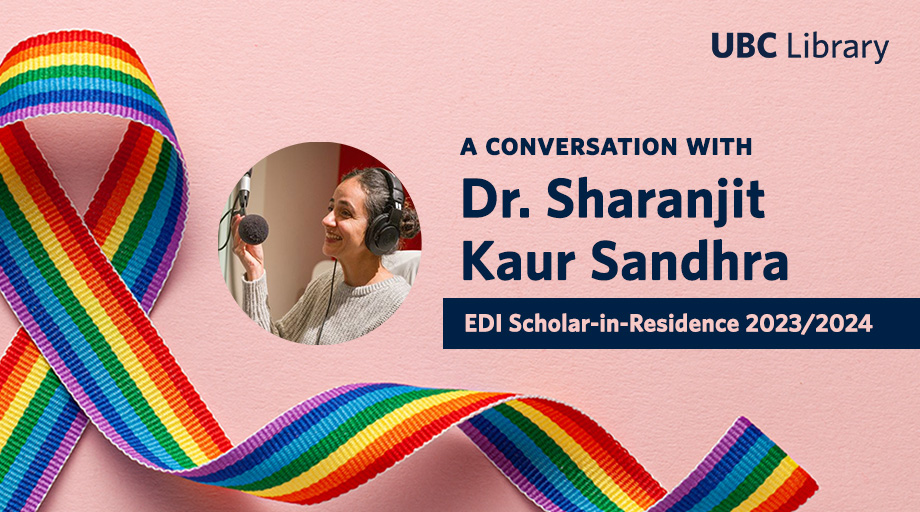
DR. SHARANJIT KAUR SANDHRA,
UBC Library EDI Scholar-in-Residence 2023/2024
Dr. Sharanjit Kaur Sandhra (Sharn) (she/her) is the founder of Belonging Matters Consulting and a sessional faculty in the Department of History at UFV and UBC. Before this, Sharn worked as Coordinator at the South Asian Studies Institute at UFV for more than 12 years and as co-curator and co-manager of the Sikh Heritage Museum, National Historic Site and Gur Sikh Temple (gurdwara). Sharn’s Ph.D. looks at the affective experiences of museum visitors through a critical race theory lens with the dissertation titled “Museums as Spaces of Belonging: Racialized Power in the Margins.” Sharn is a passionate activist, building bridges between community and academia through museum and cultural work. Read Sharn’s full bio.
Q: What have been your biggest professional challenges?
Most definitely while completing my PhD. I began in 2014 when my boys were only 3 and 5 at the time, and while continuing to work full time, and commute from Abbotsford to Vancouver in the first year when doing my classes. But beyond that, in my very first semester, I was told by a faculty member in my department of History that I do not belong in the department, and so that comment, stacked with already seeing myself as an imposter, and being the only Sikh woman in that department pushed me to an emotional brink, where I contemplated leaving the program in its entirety. Luckily, I did not, mostly in part to an amazing supervisor I had (Dr. Henry Yu), along with a supportive supervisory team with Dr. Renisa Mawani and Dr. Viviane Gosselin.
Q: What has been the highlight of the last year for you professionally?
I’ve had so many highlights – but I think starting my own consulting company has allowed me to explore the autonomy and new learning curve which intersperses both my advocacy and activism, with the on the ground work that needs to be done in various sectors like culture, municipalities, and the arts. And so starting Belonging Matters Consulting, even though I haven’t launched it widely, has provided me with exciting hope.
“That session and being amongst such incredible Asian women and writers was such a powerful moment for me…”
Q: Why did you want to participate in the EDI Scholars-in-Residence program?
I don’t think Allan even knows this, but I was invited to moderate the online LiterAsian festival in 2022. It was because of Allan that I was even invited, and I had the immense privilege of moderating a session titled “Intersectionality, Feminism, and Power – Writers Who Define Our Times” featuring authors Grace Eiko Thomson, Larissa Lai, and Sarah Suk. That session and being amongst such incredible Asian women and writers was such a powerful moment for me, and I’m so grateful that Allan saw me, and thought of me in that moment. And so, when again Allan invited me to take on yet another incredible role, I didn’t hesitate to say yes. Allan sees such wonderful opportunities to collaborate with people, and frankly, I am a very outspoken person, and so, for him to invite me to take on this important role was all that more significant.
“I want a chance to explore the Sikh historical, current, future, experience within the archives, community storytelling, from a place of resistance to the academy even, and what that means at UBC from my lived experiences.”
Q: In your consultation sessions with UBC faculty, staff or students, what topics would you love to discuss or what questions would you love to get?
I want a chance to explore the Sikh historical, current, future, experience within the archives, community storytelling, from a place of resistance to the academy even, and what that means at UBC from my lived experiences. This is really important to me, having seen the activism come out of the Farmers Protest, but also given what we are seeing take place in this moment right now. As Sikhs commemorate the 40th anniversary since its own genocide by the Indian state, I am further mindful and aware of what we see taking place against Palestinians. It’s important that as professionals and activists – we boldly bring those conversations to the forefront. And in the role and position and privilege I have, I want to foster meaningful dialogue rather than foster misinformation and stereotypes. Im lucky enough to have the community, student, staff, and faculty relationships, both within and outside UBC, to do that.
Q: Are there any resources at the library that you’re hoping to access while you’re here?
I most definitely want to revisit the Asian Studies library, which was a place I frequented often while doing my Masters degree from 2006-2008. But beyond that, I think there’s a great opportunity to help build deeper connections between the library and its EDI/Anti racism goals and with UBC’s student community in particular.
The Equity, Diversity, and Inclusion (EDI) Scholars-in-Residence program is open to scholars who hold degrees in any discipline. Residency at UBC’s Irving K. Barber Learning Centre allows Scholars to participate in collaborative and interdisciplinary public programming with a clear impact on equity, diversity, and inclusion. For more information, visit the program website.